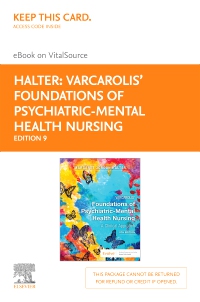
Varcarolis' Foundations of Psychiatric-Mental Health Nursing - Elsevier eBook on VitalSource (Retail Access Card), 9th Edition
Elsevier eBook on VitalSource - Access Card

Now $96.89
**Selected for Doody’s Core Titles® 2024 with "Essential Purchase" designation in Psychiatric**
Prepare for psychiatric nursing care with this comprehensive, evidence-based text! Varcarolis' Foundations of Psychiatric-Mental Health Nursing: A Clinical Approach, 9th Edition makes it easy to understand the complexities of psychiatric disorders and how to provide quality mental and behavioral health care. Clinical chapters follow the nursing process framework and progress from theory to application, preparing you for practice with real-world examples. Other notable features include illustrated explanations of the neurobiology of disorders, DSM-5 criteria for major disorders, and nursing care plans. From clinical nurse specialist and lead author Dr. Margaret Jordan Halter, this bestselling text includes new Next Generation NCLEX® content to prepare you for success on your PMHN certification exam.
-
- Case Study and Nursing Care Plan boxes include real-life vignettes of patients with specific psychiatric disorders
- Evidence-Based Practice boxes describe recent research studies and how their findings affect nursing practice
- Six-step nursing process is followed in clinical chapters, providing consistent guidelines for comprehensive assessment and intervention
- Learning features include key terms and concepts, key points to remember, critical thinking, and chapter reviews
- Conversational, mentor-like writing style reinforces important information and helps in applying textbook content to the clinical setting
- Coverage of therapeutic communication techniques and nontherapeutic communication provides tips to help you build patient interaction skills
- Assessment Guidelines summarize the steps of patient assessment for various disorders
- Considering Culture boxes discuss the importance of person-centered care in providing competent care to diverse populations in various clinical situations
- Patient and Family Teaching boxes focus on the nurse’s role in helping patients and families understand psychiatric disorders, treatments, complications, and medication side effects
-
- NEW! Next Generation NCLEX® (NGN) case studies and questions are provided at the end of each clinical chapter to support critical thinking and prepare you for your state board examination
- NEW! Updated screening tools and rating scales make it easier to quantify symptoms and assess the severity of a disorder
- NEW! Advanced practice treatment modalities are addressed separately from the nursing process in the categories of biological interventions (e.g., pharmacotherapy and brain stimulation therapies) and psychological therapies (e.g., cognitive-behavioral therapy and interpersonal therapy)
- NEW! Emphasis on adverse childhood experiences, trauma, and trauma-informed care addresses the near-universal experience of trauma in individuals with psychiatric disorders and conditions
- NEW! Order of clinical chapters mirrors that of the DSM-5, and many of the major disorders are accompanied by specific DSM-5 diagnostic criteria
- NEW! Health Policy boxes are updated to describe current legislation related to mental health
- NEW! The International Classification for Nursing Practice (ICNP), from the International Council of Nurses (ICN), provides straightforward nursing diagnoses that are easily translatable across settings and disciplines
-
UNIT I: Foundations in Theory
1. Mental Health and Mental Illness
2. Theories and Therapies
3. Psychobiology and Psychopharmacology
UNIT II: Foundations for Practice
4. Treatment Settings
5. Cultural Implications
6. Legal and Ethical Considerations
UNIT III: Psychosocial Nursing Tools
7. The Nursing Process and Standards of Care
8. Therapeutic Relationships
9. Therapeutic Communication
10. Stress Responses and Stress Management
UNIT IV: Psychobiological Disorders
11. Childhood and Neurodevelopmental Disorders
12. Schizophrenia Spectrum Disorders
13. Bipolar and Related Disorders
14. Depressive Disorders
15. Anxiety and Obsessive-Compulsive Disorders
16. Trauma, Stressor-Related, and Dissociative Disorders
17. Somatic Symptom Disorders
18. Eating and Feeding Disorders
19. Sleep-Wake Disorders
20. Sexual Dysfunction, Gender Dysphoria, and Paraphilic Disorders
21. Impulse Control Disorders
22. Substance-Related and Addictive Disorders
23. Neurocognitive Disorders
24. Personality Disorders
UNIT V: Trauma Interventions
25. Suicide and Non-suicidal Self-Injury
26. Crisis and Disaster
27. Anger, Aggression, and Violence
28. Child, Older Adult, and Intimate Partner Violence
29. Sexual Assault
UNIT VI: Interventions for Special Populations
30. Dying, Death, and Grieving
31. Older Adults
32. Serious Mental Illness
33. Forensic Nursing
UNIT VII: Other Intervention Modalities
34. Therapeutic Groups
35. Family Interventions
36. Integrative Care





 as described in our
as described in our 